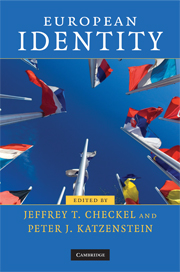
-
Select format
-
- Publisher:
- Cambridge University Press
- Publication date:
- 05 June 2012
- 05 February 2009
- ISBN:
- 9780511806247
- 9780521883016
- 9780521709538
- Dimensions:
- (228 x 152 mm)
- Weight & Pages:
- 0.57kg, 280 Pages
- Dimensions:
- (228 x 152 mm)
- Weight & Pages:
- 0.45kg, 280 Pages
- Subjects:
- Area Studies, European Studies, Political Sociology, Politics and International Relations, European Government, Politics and Policy, Sociology
- Series:
- Contemporary European Politics
You may already have access via personal or institutional login- Subjects:
- Area Studies, European Studies, Political Sociology, Politics and International Relations, European Government, Politics and Policy, Sociology
- Series:
- Contemporary European Politics
Book description
Why are hopes fading for a single European identity? Economic integration has advanced faster and further than predicted, yet the European sense of 'who we are' is fragmenting. Exploiting decades of permissive consensus, Europe's elites designed and completed the single market, the euro, the Schengen passport-free zone, and, most recently, crafted an extraordinarily successful policy of enlargement. At the same time, these attempts to de-politicize politics, to create Europe by stealth, have produced a political backlash. This ambitious survey of identity in Europe captures the experiences of the winners and losers, optimists and pessimists, movers and stayers in a Europe where spatial and cultural borders are becoming ever more permeable. A full understanding of Europe's ambivalence, refracted through its multiple identities, lies at the intersection of competing European political projects and social processes.
Reviews
‘This is the kind of volume that will fascinate scholars of European politics - and beyond. It demonstrates the multiplicity of European identities, the combination of the hopes and fears that have been braided around these identities, and the different kinds of politics that have defined and redefined its possibilities and perils as viewed from different European spaces. European Identity is less a summary of what we think we know and more of a road map for future scholarship.’
Michael Barnett - University of Minnesota
‘This timely book advances two significant claims. First, European identity has become inevitably politicized and contested. Second, next to the modern, enlightened vision of Europe, a much more xenophobic and populist identity construction has emerged, with ‘Europe to the Europeans’ as its rallying cry. Checkel and Katzenstein have collected an impressive group of authors. Their book serves as a huge question mark to the conventional wisdom that the Europeanization of identities is a benign and uncontested process of post-modern nation-building.’
Thomas Risse - co-ordinator, Research Center ‘Governance in Areas of Limited Statehood’ and Director, Center for Transnational Relations, Foreign and Security Policy, Freie Universität Berlin
Contents
Metrics
Full text views
Full text views help Loading metrics...
Loading metrics...
* Views captured on Cambridge Core between #date#. This data will be updated every 24 hours.
Usage data cannot currently be displayed.
Accessibility standard: Unknown
Why this information is here
This section outlines the accessibility features of this content - including support for screen readers, full keyboard navigation and high-contrast display options. This may not be relevant for you.
Accessibility Information
Accessibility compliance for the PDF of this book is currently unknown and may be updated in the future.


